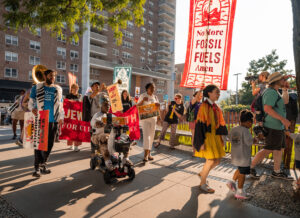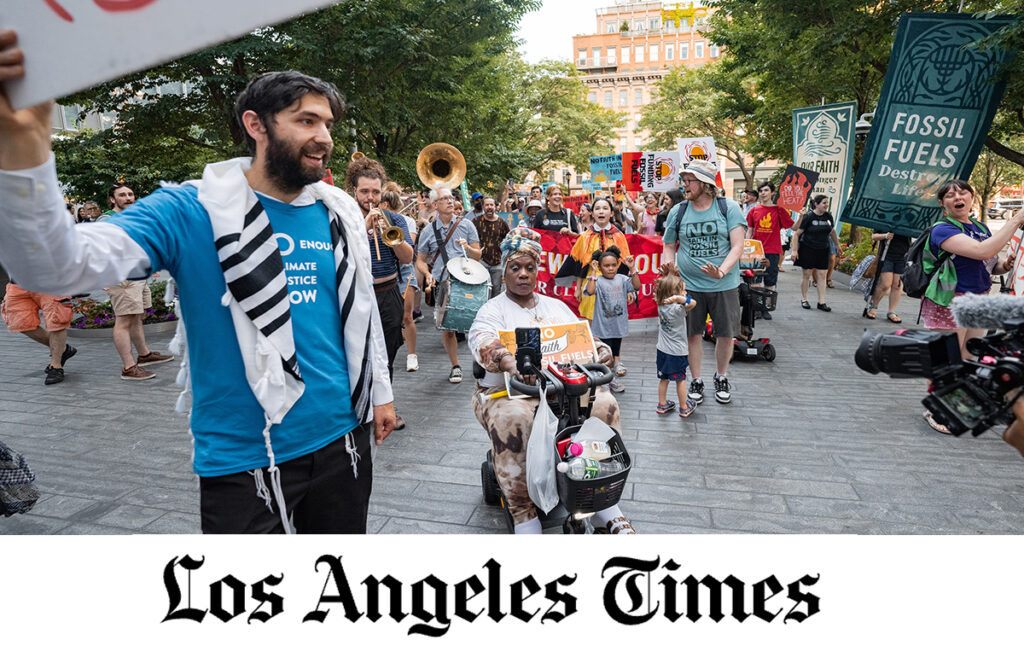Los Angeles Times | October 10, 2024
by Sammy Roth, Climate Columnist
“See, I have set before you this day life and death, blessing and curse — and [you should] choose life.”
So says Moses near the end of the Torah, reminding the Jewish people of God’s commandment to do good in the world. It’s an idea that will be front of mind for many Jews this weekend on the holiest of days, Yom Kippur.
Moses’ words should also serve as a powerful inducement to act on climate in the Hebrew year 5785.
Citing the commandment to choose life, the Union for Reform Judaism announced this spring that it would divest from fossil fuel companies, whose polluting products cause immeasurable death and destruction — making it the first large Jewish organization to do so. The union is also encouraging its 850 member synagogues to divest, or to engage in shareholder advocacy that pushes fossil fuel companies to cut their planet-warming emissions.
The union’s pledge was prompted in part by Dayenu, a Jewish climate advocacy group. In a 2022 report, Dayenu estimated that the biggest American Jewish institutions hold about $3.3 billion in fossil fuel investments.
“We should not, as a Jewish people, be investing our money in and perpetuating the fossil fuel industry when we know they are the bad guy,” said Rabbi Jennie Rosenn, Dayenu’s founder and CEO. “This is not who we are.”

It’s certainly not who I am.
For a long time, I didn’t connect my decision to write about the climate crisis with the Jewish values I was taught growing up. The Jewish concept of “tikkun olam” — repairing the world — certainly came to mind as I reported on hurricanes intensifying more quickly, heat waves growing hotter and deadlier, and wildfires burning bigger than ever. But it didn’t occur to me that my family’s Jewish heritage had helped lead me down this path.
Recently, though, I’ve started to wonder.
My dad was a senior volunteer leader with the Union for Reform Judaism, where he spread Jewish teachings to congregations across the Western U.S. and Canada. My sister-in-law works for the Jews of Color Initiative, which provides funding to many worthy causes, including Dayenu. My incredible wife is a rabbinic student at a Reform seminary, and she’s already bringing acts of healing, kindness and wisdom to those lucky enough to know her.
Then there was my paternal grandfather, my Saba, one of the greatest influences on my life.
A Reform rabbi himself, Saba died this year at age 100. My parents recently found a recording of the sermon he gave on Kol Nidre, the evening of Yom Kippur, in 1965. It was classic Saba, an urgent plea for civil rights for Black Americans, grounded in the Jewish teaching to love thy neighbor as thyself. Legislation alone, Saba said, “will be insufficient and inadequate to carry us through this tortuous and enigmatic period of history.”
Saba wasn’t afraid to demand bold change.
The U.S. government, he said in that 1965 sermon, was spending tens of billions of dollars to land a man on the moon. Wouldn’t we be better off, he asked, cooperating with Russia, and using the vast savings to raise teachers’ salaries and build housing for the poor? Couldn’t we put the money toward cleaning up contaminated rivers?
“There are few causes that should engage our endeavors with greater zeal and passion than that of the salvation of man,” Saba said. “Either all men are free or no men are. The equality of man is a touchstone of our faith.”
In a line that feels like it was written for fossil fuel divestment campaigners nearly 60 years later, Saba noted that in humanitarian causes, Jews “can point to a [consistently] enlightened attitude in the areas of philanthropy.”
“Jews have strengthened the forces and raised the standards of giving to voluntary fundraising,” he said.
Here’s the thing: When it comes to fossil fuel divestment, Jewish institutions are behind the times.
More than 1,600 institutions with nearly $41 trillion in assets have pledged to take their money out of fossil fuel companies, according to the Global Divestment Commitments Database. Roughly one-third of those institutions are faith-based organizations, including the Church of England. So far, very few of them are Jewish.
“The Jewish community has been slower to adapt,” said Rabbi Jacob Siegel, Dayenu’s climate finance advisor.
Campaigners see fossil fuel divestment as a useful tool, not a comprehensive climate solution.
One desired outcome — if the movement were to gain enough support — would be to deprive big-time polluters such as BP, Chevron, Exxon Mobil and Shell of the funds they need to keep investing in new oil and gas fields.
During an interfaith protest designed to put pressure on Wall Street, Siegel spoke outside Citigroup headquarters in New York in July. He and other religious leaders urged the bank to stop funding new fossil fuel drilling.
“We have moral clarity,” Siegel said. “We don’t need new coal, oil and gas. We have enough.”
Even if divestment doesn’t stop oil and gas barons from drilling to their wallets’ content — at least not right away — climate campaigners hope to make a symbolic statement: that profiting off oil and gas is not OK. They hope to create momentum for policy change, by building a movement of individuals and institutions working in harmony to shun the companies wrecking the planet — and to lay the groundwork for their eventual demise.
If that sounds political — well, it is. Which is sad, because climate change wouldn’t have become so controversial if not for decades of fossil fuel industry science denial. Global warming is a human rights issue, with the neediest among us — the poor, people of color, pregnant women, the elderly, farmworkers — suffering first and worst.
Even with moral clarity on their side, divestment campaigners have a tough fight ahead. But then again, it wasn’t so long ago that civil rights were politically controversial. And Reform Jews didn’t shy away then, either.
Portions of the 1964 Civil Rights Act and the 1965 Voting Rights Act were drafted in the conference room table of the Religious Action Center, the Union for Reform Judaism’s advocacy arm. Kivie Kaplan, who served as vice chair of the union’s board, was a longtime NAACP president. Reform leaders were arrested with the Rev. Martin Luther King Jr. while challenging racial segregation, as the Religious Action Center recounts on its website.
The Union for Reform Judaism draws a distinct line from civil rights to the climate crisis. Its fossil fuel divestment resolution quotes King: “We are now faced with the fact that tomorrow is today. We are confronted with the fierce urgency of now. In this unfolding conundrum of life and history there is such a thing as being too late.”
Indeed, climate scientists say we must slash heat-trapping pollution more than 40% globally by 2030 and at least 60% by 2035 to keep Earth’s average temperatures from rising beyond 1.5 degrees Celsius. Even if we fail to meet that target, every bit of global warming avoided means fewer deaths, less economic damage, less chaos.
“Social justice movements are a hallmark of Reform Judaism. This resolution [on fossil fuel divesting] is the most recent action in that tradition,” said Barbara Weinstein, associate director of the Religious Action Center.
It turns out the Union for Reform Judaism has no direct investments in fossil fuels. But it does own mutual funds with fossil fuel stocks. It’s working to adjust its holdings to screen out fossil fuel companies, and possibly redirect the money toward clean power — which, by the way, already accounts for nearly 60% of California’s electricity.
So far, though, not many Reform institutions have heeded the union’s call.
“A few synagogues are looking at it,” Weinstein said.
In some ways, the lack of immediate action isn’t surprising. The rabbis and laypeople who lead synagogues are busy, their attention already pulled in many directions. To the extent they’re thinking about sustainability — and many congregations do have green teams — they tend to focus on traditional initiatives such as recycling.
The boards and finance committees responsible for managing synagogues’ money, meanwhile, may feel bound by their fiduciary duty — basically, their oath to responsibly manage investments. Even if they care about climate change, they may get nervous about the idea of moving around funds based on a political cause.
Divestment supporters note that the Reform movement previously divested from companies doing business in South Africa during apartheid, and from companies supporting Sudan’s government during the Darfur genocide. Dayenu points to analyses finding that renewable energy stocks have at times outperformed oil and gas.
But even if Jewish institutions can benefit financially from fossil fuels, is that what we want? Is that who we are?
I realize some of you probably think divestment sounds pointless. That oil and gas companies will keep polluting anyway. That we should take their dirty profits and put the money toward electing better politicians who will pass better laws that eventually replace oil and gas with clean energy. That we should be realistic, not radical.
Would you have said the same thing during the civil rights movement? Would you have asked Black Americans to be patient? To stop getting arrested? To just show up at the ballot box until eventually their lives got better?
I can hear Saba’s answer: Legislation isn’t enough. Moderate steps are inadequate. We need zeal and passion.
“There are times when we feel overwhelmed by the malevolent forces of evil in the world,” Saba said in his Yom Kippur sermon in 1965. “We sometimes forget that the most effective manner of combating darkness is through the principle of light. Let us in our own lives meet the challenges of evil and darkness by lighting a candle.”
This Yom Kippur, let’s continue to choose light — and life.

